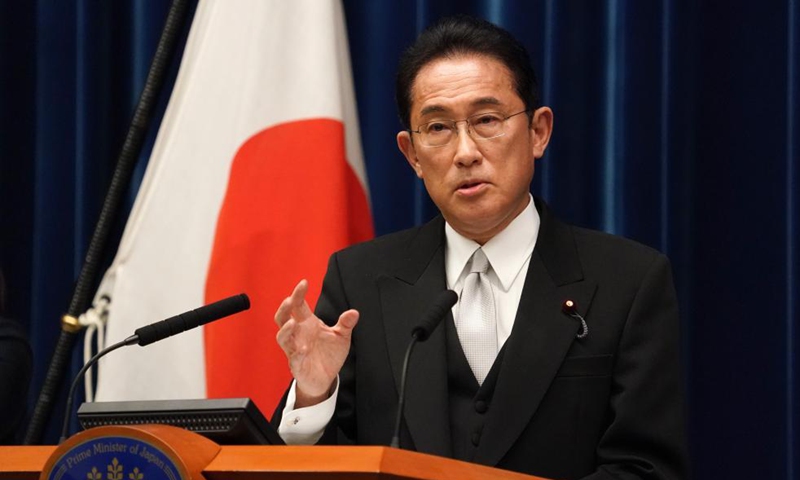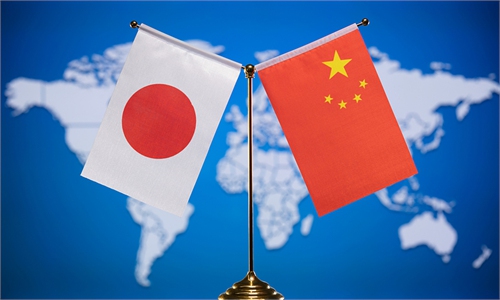Kishida makes ‘bad start’ by sending ritual offering to Yasukuni; foundation of China-Japan relations eroded, observers warn

Japan's new Prime Minister Fumio Kishida speaks during a press conference at prime minister's official residence in Tokyo, Japan, on October 4, 2021. Photo: Xinhua
The new Japanese Prime Minister Fumio Kishida made a "bad start" by sending a ritual offering to the controversial Yasukuni Shrine, where the war criminals are enshrined, on Sunday, only two weeks after he took office. The move, following in the footsteps of his predecessors Shinzo Abe and Yoshihide Suga, demonstrated again the rise of right-wing conservative forces in Tokyo, Chinese observers said, warning that the foundation of China-Japan ties is being eroded through a series of provocative moves.
Japan Times reported that the new Japanese prime minister on Sunday sent a ritual offering to Yasukuni to mark the shrine's autumn festival. Yasukuni Shrine has been viewed as a symbol of Japan's past militarism by its Asian neighbors. It was the first such observance by Kishida since he took office on October 4, the report noted.
Kishida does not plan to visit the shrine during the festival, said the report.
Former prime minister Shinzo Abe's Yasukuni visit in December 2013, a year after the start of his second stint as prime minister, prompted outrage from China and South Korea and also disappointed Japan's key ally the US, media said.
South Korea's Foreign Ministry issued a statement on Sunday expressing "deep disappointment and regrets" over Kishida's sending of ritual offering and Suga's visit to Yasukuni Shrine. "Yasukuni Shrine is a place where Japan's war of aggression was glorified and war criminals were enshrined, hoping the Japanese government will take concrete actions to sincerely reflect on and face up to history in a humble manner with the new cabinet in office," the statement said.
Suga only made offerings during his one-year leadership. He stepped down in September and visited the shrine on Sunday.
Under the influence of growing right-wing forces in Japan, it has seemingly become a routine in recent years for every Japanese prime minister to send ritual offerings to the Yasukuni Shrine, and they will also visit the shrine after stepping down, Liu Jiangyong, vice dean of the Institute of Modern International Relations at Tsinghua University, told the Global Times on Sunday.
Both visiting the shrine and sending ritual offerings have been strongly opposed by many peace-loving people in Japan and the international community, and has also caused tensions between Japan and other Asian countries such as China and South Korea, said Chinese observers.
The move is disruptive as it goes against the historical view of war, Liu said.
Kishida, who has been viewed as a relatively dovish politician, had never visited nor sent ritual offerings to the shrine until he took office as prime minister. Liu believes Kishida was trying to play an "edge ball" by sending an offering to the shrine during the festival while claiming that he is merely following his predecessors.
Kishida is engaging in wishful thinking, according to Da Zhigang, director and research fellow at the Institute of Northeast Asian Studies at Heilongjiang Provincial Academy of Social Sciences and chief expert at the Northeast Asian Strategic Studies Institute. On the one hand, he does not want to provoke Japan's neighboring countries and create diplomatic problems concerning the sensitive historical matter ahead of the 2021 Japanese general election. On the other hand, he is looking to gain support from Tokyo's conservative forces at a time when his domestic approval rating is low.
However, "a little leak can sink a great ship," Liu said. If the Japanese politicians continue to send offerings to and visit the shrine instead of reflecting on Japan's past aggression under its militarism, the foundation of China-Japan relations could be eroded, Liu warned.
"I hope he will not follow bad examples," said Liu, noting that Japan's international image and the maintenance of the post-war international order need to be carefully considered by the Japanese leader.
On alert
In an interview with Yomiuri Shimbun on Friday, Kishida said he would consider specifying the possession of capabilities to destroy enemy missile bases under the National Security Strategy while expressing his hopes of visiting the US by the end of this year for a summit with US President Joe Biden.
Specifying in the security strategy the capability to strike enemy bases for self-defense purposes was "one option", said the prime minister, regarding threats such as hypersonic glide weapons and ballistic missiles flying on irregular trajectories that North Korea is developing.
As for when the government would aim to revise the National Security Strategy, Kishida said, "I want to do it as soon as possible," but stopped short of mentioning a specific timeline, Yomiuri Shimbun reported.
In 2020, then Prime Minister Shinzo Abe announced that the government would consider acquiring the capability to strike enemy bases.
Chinese Foreign Ministry spokesperson Zhao Lijian has said earlier that Japan's military security moves have been closely watched by the international community and its Asian neighbors due to historical reasons. Some people in Japan have long hyped up so-called external threats in an attempt to loosen ties and make breakthroughs in military and security policies. What Tokyo is up to is only too evident, said Zhao. He urged Tokyo to earnestly learn lessons from history, honor its commitment to "exclusive defense" and continue to follow the path of peaceful development with concrete actions.
Da warned China to be on high alert over the revision of Japan's National Security Strategy, as Japan is trying to lift the ban on self-defense and expand bilateral and multilateral cooperation with Europe and the US in response to geopolitical security concerns.
As Kishida expressed his hopes of meeting Biden in the US soon, it can be expected that the two priorities of the possible visit could be to reiterate that Article V of the US-Japan Security Treaty applies to the Diaoyu Islands, and to promote a free and open Indo-Pacific, Liu predicted.
Also, the Taiwan question cannot be ruled out from their possible meeting, Liu noted.
The Taiwan question and the Diaoyu Islands issue are tests for Japanese politicians' collective political wisdom, observers said. If it is not handled properly, playing with this hot button issue will lead Japan down a dangerous road, they warned.



